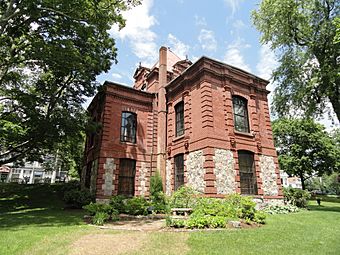John Eliot Historic District facts for kids
Quick facts for kids |
|
|
John Eliot Historic District
|
|

Bacon Free Library
|
|
| Location | Union, Pleasant, and Eliot Sts., Natick, Massachusetts |
|---|---|
| Area | 71.22 acres (28.82 ha) |
| Built | 1651 |
| Architectural style | Greek Revival, Federal |
| NRHP reference No. | 83000812 |
| Added to NRHP | June 23, 1983 |
The John Eliot Historic District is a special area in Natick, Massachusetts. It was once the very first village center of Natick. Today, it's the heart of a place called South Natick. This district shows off many different kinds of buildings from the 1700s to the early 1900s. These buildings are found along old roads from the 1600s. This historic area was added to the National Register of Historic Places in 1983.
Contents
Exploring South Natick's Historic Core
The center of South Natick village is in the southeastern part of Natick. It's where Eliot Street (Massachusetts Route 16) meets Union and Pleasant Streets. This area is just north of a bend in the Charles River. It has a long history of both Native American and colonial settlements.
Early Native American Life
The roads in this district probably existed before 1651. They were likely trails used by Native Americans. In 1651, a missionary named John Eliot started a special settlement here. It was for Native Americans who had converted to Christianity, known as "Praying Indians." This was the very first settlement of its kind.
The Charles River and Early Industry
The bridge over the Charles River today is in the same spot where an early footbridge once stood. The South Natick Dam is built where there used to be a natural waterfall. This waterfall was also a place where Native Americans built a "fishing weir" to catch fish. The Native American settlement started with about 180 people. By 1797, only 20 remained.
The town of Natick was officially formed in 1781. By then, most of the people were white settlers. The main town center moved to a more central location. The first dam in the village was built in 1752. The area that is now a town park by the river was once an industrial site. It had mills for processing cloth and cutting wood.
Architecture and Famous Homes
The historic district is shaped like an "X," spreading out from the central meeting point of the roads. The center of the district features several important buildings. The John Eliot Church, built in 1828, has a Federal-style design. The former John Eliot Congregational Church, built in 1862, is in the Gothic style.
The beautiful Bacon Library was built in 1880. It was designed by Robert G. Shaw. Part of the library stands over an old Native American burial ground from the colonial era. This burial ground is a very important archaeological site in the district. The village also has the homes of two famous 19th-century writers. One was the home of Harriet Beecher Stowe. The other, a National Historic Landmark, belonged to Horatio Alger.
 | Mary Eliza Mahoney |
 | Susie King Taylor |
 | Ida Gray |
 | Eliza Ann Grier |



